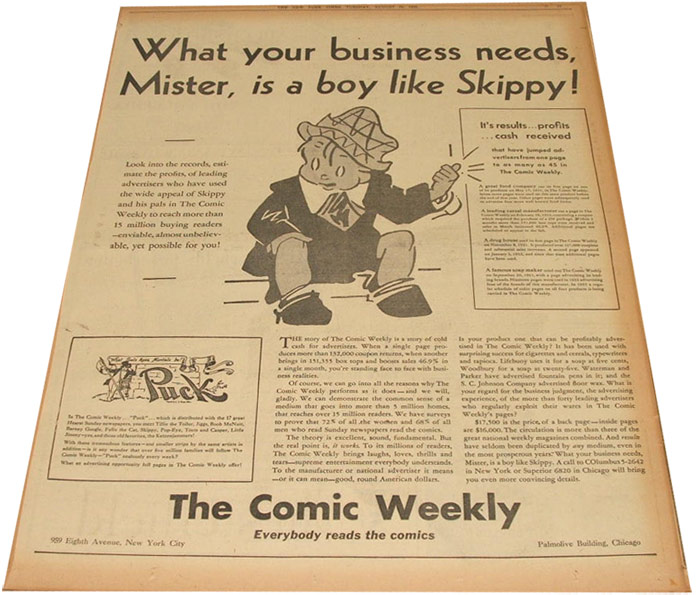|
"What your business needs, Mister, is a boy like Skippy!"
The New York Times of August 22, 1933 has a full page ad featuring Percy Crosby's famous "Skippy", which was syndicated worldwide in 14 languages by the Hearst Newspapers. It states: "Look into the records, estimate the profits of leading advertisers who have used the wide appeal of Skippy and his pals in The Comic Weekly to reach more than 15 million buying readers--enviable, almost unbelievable, yet possible for you!" This was during the Great Depression, when businesses sought popular characters to increase their dwindling sales. Skippy's goodwill helped many businesses to survive.

Click on text to Left of SKIPPY™ for enlarged view
Click on text in bottom of article for enlarged view.
This ad appeared two weeks before Skippy, Inc. sued Rosefield, then a bankrupt, small company, in the U.S. Patent Office, to prevent Rosefield (Unilever's predecessor) from registering Skippy's trade name as a trademark for peanut butter. Skippy prevailed on Jan. 9, 1934, which decision cited the leading Supreme Court decision, prohibiting Rosefield from registering Skippy's entire corporate name and identity as a matter of statutory law. (Skippy, Inc. v. Rosefield Packing Co., Ltd., Opposition 13134, citing American Steel Foundries v. Robertson, 269 U.S. 372, (1926)). Rosefield did not appeal, and the decision became binding, prohibiting any future attempt to register the mark without permission from Skippy and its president, Percy Crosby. Rosefield, aided and abetted by its corrupt Chicago lawyer, and its allies in the peanut butter industry, schemed to ignore the decision and conspired to take over Skippy's licensing business, and to destroy Crosby's reputation as a famous American artist.
Despite Crosby's protests, Rosefield registered SKIPPY in the Patent Office in 1948 (U.S. Reg. 504,940) at same time as Crosby's suicide attempt. He was railroaded to a New York mental hospital by Rosefield's associates, and held hostage until his death in 1964, unable to enjoin the Skippy peanut butter racket (click here to see the forgery) Rosefield sold the stolen name to Best Foods, Inc. in 1954, which was advised to cover up its knowledge of the binding 1934 Skippy decision if the heirs later sued. The Patent Office public record of Rosefield's defeat was deliberately destroyed when Crosby died, which enabled Rosefield et al. to obstruct justice while destroying other key evidence. Despite years of litigation (1965-68, 1980-87, 1999-2005), and Bestfoods' merger with Unilever in 2000, their website version of the Skippy history shows conscious avoidance of any Skippy lawsuit, or the adverse 1934 decision.
Yet, to this day, Unilever claims its bona fide date of first use is Feb. 1, 1933, the same date of Rosefield's 1933 denied SKIPPY application. Unilever Bestfoods, very concerned about adverse publicity, tried to shut down Skippy's website, but lost on appeal, the court upholding Skippy's and Crosby heirs' First Amendment rights (214 F.3d 456, 4th Cir. 2000). Unilever blindly heeds the unspoken public relations formula: "Never admit a wrong, just do what is necessary to kill the story before it kills you." They even got a later court to sanction Skippy and its lawyer, but then backed down when Skippy again appealed.
So, this New York Times " Skippy" ad in 1933 has a strong message to Unilever about fair, honest advertising as opposed to playing fast and loose with our government of laws: "What your business needs, Mister, is a boy like Skippy!" --the true character created by Percy Crosby that Unilever Bestfoods sought to censor and dilute-- not the funky 21st century interpretation of a blond-haired boy Unilever's ad agencies created to confuse and destroy Skippy's famous identity.
|
